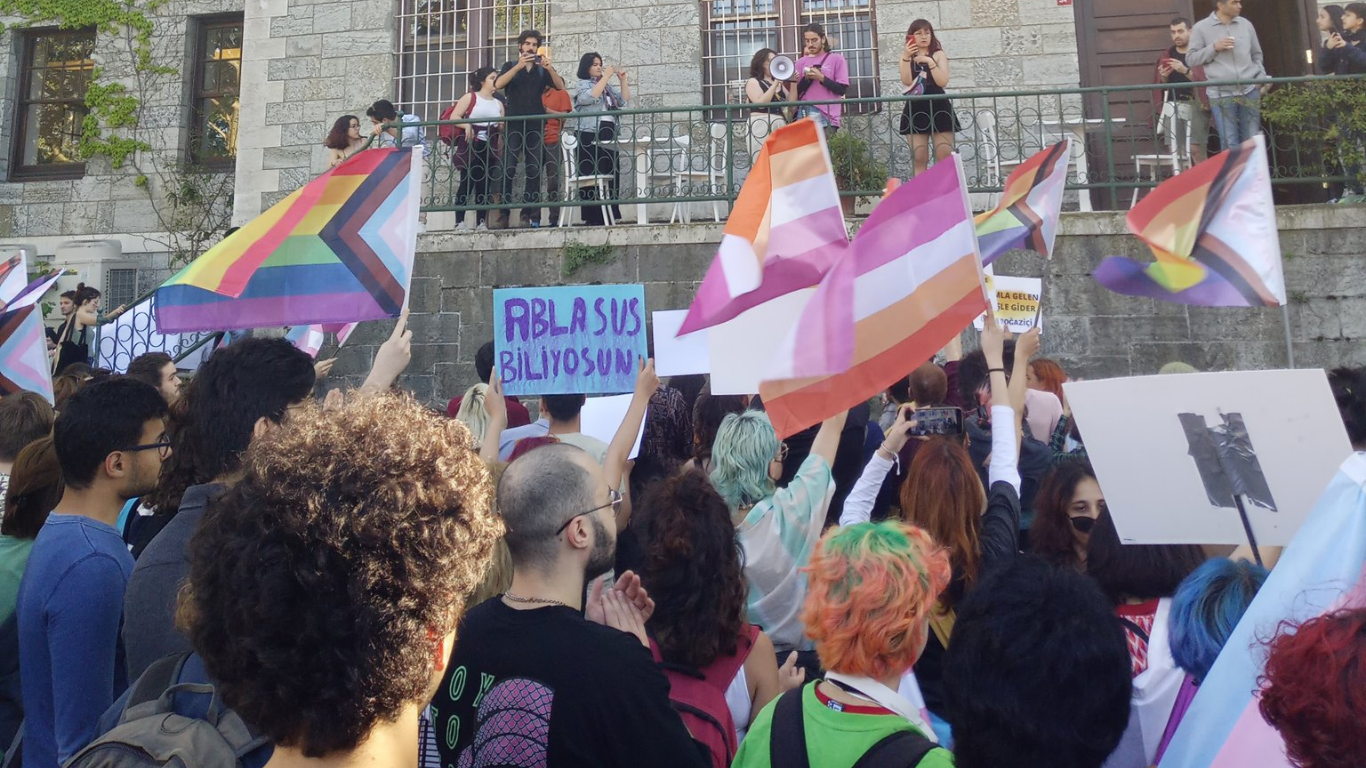INTERVIEWS ON THE LAWSUIT AGAINST 9TH BOĞAZİÇİ PRIDE #1
“a kind of psychological warfare”
The final hearing of the case against 69 people, who were detained and tortured for participating in the Pride march at Boğaziçi University on 20 May 2022, known as the ‘Boğaziçi Pride Case,’ will be held on the 25th of October at Istanbul Justice Palace.
At the 5th of April hearing, the prosecutor requested that 69 students be sentenced for “taking part in an illegal march and failing to disperse despite being warned,” and two students for “resisting in order to prevent the officers from performing their duty.”
We have been following the case of the students detained for gathering at the Pride march at Boğaziçi University since the first hearing. In order to understand their perspectives on the case, we interviewed three students. In the first of those interviews, our guest is Beyda. Beyda is a sociology student at Boğaziçi University and is active in the Environmental Society Club (BÜÇEK) and various youth organizations.
Can you briefly tell us about the day of the march?
We wanted to hold the march just like the ones in the previous years. This was the first Boğaziçi Pride march I had the opportunity to participate in. We gathered at the square [Üstün Ergüder Quadrangle] where the call to march had been made. We walked a bit, but security guards blocked our way at various points. Eventually, we ended up in an area that had been designated for us, but the route was blocked by riot squad and police vehicles. It was during this blockade that I saw Hanifi Zengin, Istanbul Police Department Security Branch Director and a figure accused of harassment, for the first time. He spoke in an offensive and intimidating manner. We were beaten and detained without any warning. Their aim was to intimidate us and prevent us from helding future marches.
How did this first Pride march you attended affect you?
I confronted the harsh reality of the state directly and faced an enmity that arose solely from our identity: being a lubunya [“queer” in İstanbul LGBTI slang]. Actually, I don’t identify myself as a lubunya. I came there as a supporter but, of course, you become one there. I characterized myself as such because I experienced the same things as if I were a lubunya, and because I was antagonized in the same way.
That day, the police ambushed us. It was ugly and appalling; I had never seen anything like that before. While I had become politicized and joined [political] organizations, I had never encountered such a harsh reality. I was still new to this then, and that incident made me reflect on this:
How are they making enemies out of us? How can the state do this when it does nothing to rapists and murderers of women? So I declared, “There’s no other way but to fight back!” That experience had a profound impact on me. Unfortunately, there are also friends who feel the opposite effect.
You mentioned it was clear they would detain you. Can you explain why you think that?
The police don’t detain people by thinking, “No one dispersed, we had to detain them.” They do it to intimidate us. They didn’t even warn us to disperse. This has been the case in Turkey for a long time. They particularly target individuals known from the protest committee and/or the LGBTI+ struggle. They do it to instill fear.
As students, we face numerous challenges: family issues, scholarships, future prospects, etc. Your scholarship can be stripped of if you are detained or arrested. This was my first detention, and I feared losing my scholarship.
Do you see a difference between participating in a protest individually or with a [political] organization?
Yes, there is a significant difference. When you participate in a protest with an [political] organization, you know you’re not alone; there are people who constantly check on you. Friends who have experienced detention before can inform you about what to expect. This knowledge helps you understand more or less what will happen and how the process will unfold. If I were alone, I would feel scared and isolated, which could lead to frustration.
Can you tell us about your lawsuit?
I could not attend the first hearing; I attended the second and provided my statement. I said, “I participated in the protest because it is my right.” After that hearing, our lawyers decided that those who testified wouldn’t have to attend subsequent hearings, so I didn’t go to the next ones.
Moreover, the lawyers aimed to avoid prolonging the lawsuit because the longer it lasts, the more frustrated people become. Questions like, “What will be the outcome of the case? Will there be a punishment?” arise. It is like psychological warfare.
How do you evaluate the fact that a lawsuit has been filed against this march?
The filing of a lawsuit means potential punishment, and it can affect even the opportunities for studying abroad. For those who have never had a lawsuit before or those who are not part of an [political] organization, it creates a constant state of fear that distracts them from the struggle. The authorities are aware of this, and they use it to deter people from participating in actions and political activities in the future.

